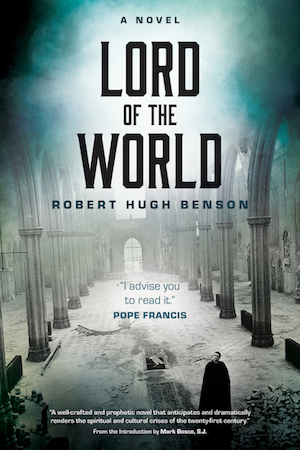Classics Club Book #3: Lord of the World by Robert Hugh Benson
The two Cities of Augustine lay for him to choose. The one was that of a world self-originated, self-organised, and self-sufficient, interpreted by such men as Marx and Hervé, socialists, materialists, and, in the end, hedonists, summed up at last in Felsenburgh. The other lay displayed in the sight he saw before him, telling of a Creator and of a creation, of a Divine purpose, a redemption, and a world transcendent and eternal from which all sprang and to which all moved.
 Before Fahrenheit 451, before Nineteen Eighty-four, before Brave New World, there was Lord of the World by Robert Hugh Benson. Recommended by Pope Francis at least twice, this 1908 dystopian novel by a Catholic priest is both challenging and disturbing, and is possibly more relevant now than at any time since it was first published.
Before Fahrenheit 451, before Nineteen Eighty-four, before Brave New World, there was Lord of the World by Robert Hugh Benson. Recommended by Pope Francis at least twice, this 1908 dystopian novel by a Catholic priest is both challenging and disturbing, and is possibly more relevant now than at any time since it was first published.
The story is set in the early 21st century and is eerily prophetic in predicting some of the bleaker moments of the last 100 years. Benson imagines a future that is on the brink of world war, in which weapons of mass destruction exist, and in which euthanasia houses are commonplace.
In many dystopias, it is the government or religious institutions that are the totalitarian authorities creating a bleak future. In Lord of the World, however, Benson shows the development of secular humanism from benevolent philosophy to oppressive ideology. Once the secular humanists gain control of the entire planet, things go horribly wrong, despite their promises of world peace.
Benson’s novel is a counterpoint to the science fiction of writers like H.G. Wells, who believed that secular humanism would lead the world out of darkness and into a utopian paradise.
In Lord of the World, secular humanism becomes a twisted distortion of religion, complete with its own liturgy and dogmas. It is represented by Julian Felsenbergh, an anti-christ character who comes from nowhere (actually, Vermont) to save the world from war. Opposing him is his mirror image, a priest named Fr. Percy Franklin who looks just like him, but who resists the lure of the materialist, humanist philosophy. As the Catholic Church continues to be a formidable force against the humanist government the conflict intensifies with apocalyptic results.
Lord of the World has all the dystopian elements readers expect and more: dire predictions about the future, characters fighting against an oppressive regime, military attacks against the resistance, and lost souls trying to find their way.
I was moved by this book. There are some truly harrowing scenes in the novel, scenes that will remain with me for a long time. But there were also some beautiful scenes in the book, too, scenes that give me hope and encouragement.
Lord of the World is a powerful book that would make an excellent read for a book group, especially in Catholic parishes. It is also substantial enough to teach in Catholic high school literature classes.
Highly recommended.
Lord of the World by Robert Hugh Benson
First edition London: Dodd, Mead and Company, 1908
Kindle edition Ave Maria Press Christian Classics; Reprint edition, 2016
Print length: 353 pages































